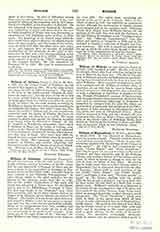

William of Malmesbury, b. November 30, about 1090; d. about 1143. He was educated at Malmesbury, where he became a monk. From his youth he showed a special bent towards history, “Thence it came that not being satisfied with the writings of old I began to write myself”. By 1125 he had completed his two works, “Gesta Regum” and “Gesta Pontificum”. After this he spent ten years in forming a collection of historical and legal materials, now in the Bodleian Library, and writing a history of Glastonbury and its saints, in which he speaks as though he were, for the time at least, an inmate of that abbey. He records that he might more than once have become Abbot of Malmesbury, but he contented himself with the office of librarian. About 1140 he made revisions of the two works “Gesta Regum” and “Gesta Pontificum”, and began a new work “Historia novella”, a sequel to the former, dealing with the period 1125-42, but in such a desultory way as to show that we have rather the first draft of a book than a completed work. William’s authority as a historian is invaluable for the contemporary reign of Stephen, and his records of the earlier Norman kings, being based either on personal knowledge or direct hearsay, are of importance. The “Gesta Pontificum”, which owes much to Bede, is the source from which all later writers of early ecclesiastical history of England have chiefly drawn. His method, also derived from Bede, was to recount events so as to show their cause and effect, and in returning to this sound principle he made a great advance on the works of his predecessors. The anecdotes, occasionally irrelevant, which he weaves into his narrative, helped much to preserve its popularity through the Middle Ages. His chief works have been printed by Migne, but the Rolls Series includes the critical edition.
EDWIN BURTON

